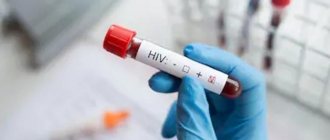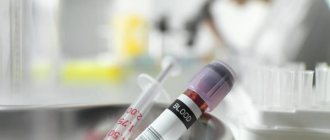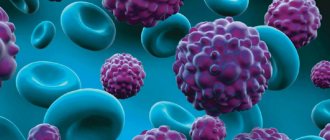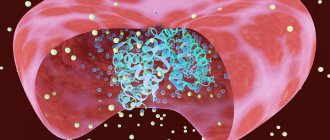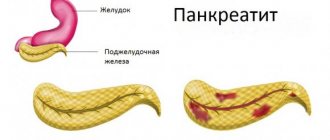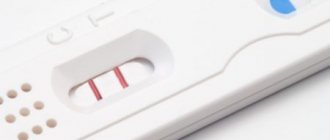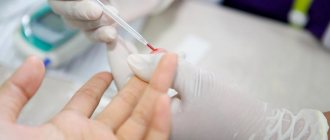Hepatitis C negative is the record that every person who is tested for the presence of the virus expects to see. But the insidiousness of viral hepatitis is that in patients with strong immunity, after infection, a long time may pass before the analysis shows the presence of infection and symptoms appear. Therefore, after receiving a negative result, you cannot be sure of complete health, especially if the person is at risk of infection.
Coronavirus antibody test: what is it?
To determine the presence of antibodies to COVID-19 in the patient's blood, a blood sample is taken. Depending on the research method, the result will be obtained within 10 minutes (express tests) or within 3 days.
Antibody testing answers two questions:
- Are you currently infected with coronavirus?
- Has the person been sick and has immunity to the disease been developed?
Modern test systems can accurately determine the presence of antibodies to coronavirus.
Interpretation of analyzes
Immediately after blood collection, the patient is informed about the time the test will be ready. As a rule, verification takes several days. A list of what a client should know when testing for HIV is publicly available. Therefore, if a person believes that he has not been given enough information, he can check the data received with the permitted list. Data on indicators after research using the polymerase chain reaction method are stored for several years. If necessary, a person can obtain copies of records of all cases of analysis. Often this opportunity makes it possible to identify medical errors or cases of infection in the hospital.
What is the difference between a PCR test and antibody tests?
Antibody tests are an auxiliary study that gives an idea of the stage of infection and the presence of immunoglobulins in the human body.
PCR diagnostics are used by the Ministry of Health as the main method of analysis for coronavirus infection, allowing it to be detected from the first days of infection.
Let's consider what types of tests are advisable to use at different stages of the disease:
| Infection period | Estimated time since infection, in days | Test Method |
| Incubation | 1-14 | PCR |
| Early deadline | 5-10 | PCR, IgM antibodies |
| Active phase | 8-14 | PCR, IgM and IgG antibodies |
| Recovery | 14-24 | PCR, IgG antibodies |
| Full recovery | more than 24 | IgG antibodies |
There are symptoms, but the test is negative
Many people do not trust laboratory test results. A negative HIV test may be accompanied by symptoms of the disease, leading to doubt. It is important to understand that HIV does not have its own symptoms, so if all the symptoms of HIV are present and the result is negative, there may be another disease or inflammation. It is worth conducting a comprehensive examination to identify the source of poor health. Such results are double-checked by doctors themselves when using drugs intravenously. The fact is that this habit often encourages people to rush and not observe hygiene standards, therefore the risk of infection is much higher. When using psychotropic substances, the amount of atm may decrease down to trace amounts in the sample, which will directly affect the data of the PCR study.
Some pathological processes occur without a clear clinical picture. For example, blood diseases and bleeding contribute to an increase in the inflammatory process, and therefore antibodies.
If the disease is still confirmed, prevention and treatment can help the person. The life of infected people has increased several times in recent decades. If previously a person with HIV+ could live up to two years, now, taking into account treatment and the properties of blood, this period reaches 50 years.
Thus, when conducting an analysis, it is worth taking the results seriously and double-checking them. If the disease is finally confirmed, it is important to remember that HIV is not a death sentence for many people. So you need to continue to live and enjoy life.
Why do you need a Covid-19 antibody test?
The virus, penetrating the human body, begins to produce special antigen proteins. In response to them, the immune system releases immunoglobulins (proteins - antibodies). In the early stage of the disease, testing detects IgM antibodies in a person’s blood, and at the end of the disease IgG. It is their presence in the patient’s blood that makes it possible to recognize contact with the virus.
At an early stage of the disease, the result may be false negative, which subsequently requires a PCR test. But after the patient has overcome the disease, specific IgG antibodies are formed, which remain in the blood for a long time.
Information about the number of people who have recovered from coronavirus makes it possible to keep statistics on the disease. It has been noted that many are able to survive the infection asymptomatically or in a mild form. All of them are not included in the number of those exposed to the virus.
Widespread testing will also allow citizens to begin the process of returning to normal life without risk to themselves and others. It is very important now to try to keep the pandemic under control and wait for a vaccine to arrive.
Identifying antibodies to the disease will help immunize patients suffering from severe disease. From those who have antibodies to coronavirus, it is possible to take blood samples to separate the serum. It contains specific proteins that trigger the process of fighting the disease. As a result, patients recover faster and easier.
Negative Rh factor blood, what should the patient know?
Remember! A negative factor is not a sentence or death. This is a feature of your body, with which you can live as fully as everyone else. But we suggest that you familiarize yourself with 5 mandatory rules. By following them, you will protect your life and save the lives of others. This is unique information; you will not find such advice in other sources, since we consulted with therapist Danilov. V.S.
“Any doctor can prescribe a blood transfusion, a therapist first of all, and the procedure will be carried out by a resuscitator. I ask and advise people with negative Rh to come and donate blood. This is very important for negative patients who are in trouble. Many arrive in an unconscious state; most often there is simply not enough time to find out their blood type. Therefore, this is not the first time I have thought that your blood type should be indicated almost in your passport, and if not, then tattoos are now relevant.”
The specialist shared his vision to protect life and point the doctor to your group if you are unconscious:
- Tattoos. This is a popular phenomenon on the bodies of many young people. Therefore, why not decorate your hand or wrist with a small and clear indication that you have a rare blood type and rhesus. This method has become widespread abroad, and if you get a tattoo, then let it bring not only beauty, but also benefits.
- Donate blood if you do not have infectious diseases and fresh embossed patterns on your body. The blood of a person with a negative group will save not a single life. If you have the opportunity to do such an act, do it.
- Friends and relatives should know the rarity of your case. Warn them because they are the first people who can give accurate information about the victim to the doctor.
- Bracelets, chains, pendants with engraving can also warn the doctor about the unique composition of your blood. Buy a metal bracelet and have it engraved.
- Vigilance and caution. A banal but valid piece of advice - be careful and give a clear account of your actions so as not to fall under the surgical knife at all.
Covid-19 antibody test results
There are five options for interpreting the analysis:
- IgM < 1, IgG < 10 – no antibodies to Covid-19 were detected, take precautions;
- IgM: from 1 to 2, IgG: < 10 - the result is questionable, you may be a carrier of the disease (take the test again in a week);
- IgM < 2, IgG ⩾ 10 - antibodies to the virus have formed. You are not dangerous to others, but take precautions to avoid re-infection;
- IgM: ≥ 2, IgG: < 10 - initial stage of the disease, you are a carrier of the virus (self-isolation for 2 weeks is required).
- IgM ⩾ 2, IgG ⩾ 10 - there are antibodies, but the virus is present in the body, do not contact others; the disease may be asymptomatic (repeat the test in a week).
First signs
HIV has no characteristic symptoms and can be confused with other infectious diseases. But there are signs of HIV infection, and if they appear, you should go to a medical facility and get tested.
These include:
If you suspect HIV infection, you should consult a doctor as soon as possible.
Coronavirus antibody test positive or negative – what does this mean?
Depending on the test result, further tactics for working with the patient are determined:
| IgM antibodies | IgG antibodies | Interpretation |
| IgM — | IgG - | There are no antibodies in the blood, the result is not sick. If the PCR test gives a positive result, after treatment it is necessary to do a second PCR test for IgM antibodies (to determine whether the patient is sick or a carrier), IgG (to evaluate the formation of immunity). |
| IgM + | IgG - | Early stage of the disease, you need to contact the clinic to conduct a PCR test to confirm infection and repeat IgG later to assess the formation of immunity. |
| IgM+ | IgG+ | The disease is in the active phase and may be asymptomatic. There is a possibility of infection from a carrier. You need to go to the clinic and not contact people. Repeat the PCR test later to find out if there is an infection. |
| IgM - | IgG+ | Your immune system is formed, which means you have already been ill. To assess immunity, do a quantitative IgG test. |
When can HIV be detected?
The immunodeficiency virus has periods of activation and periods of rest. During the rest period, the result for HIV will be negative, regardless of the duration of infection. A few weeks after the suspected infection, the disease can only be detected. If it is possible to determine a positive result, it is necessary to conduct a repeated in-depth analysis. This disease requires special control and attention, so any result must be double-checked several times before a final verdict is made. In any case: positive test or negative, it must be checked several times on different devices.
What methods are used to test for antibodies?
To determine the presence of antibodies to coronavirus, the following types of testing are used:
ELISA method
The enzyme immunoassay (ELISA) method is quite simple in principle. Microplates (plastic plates) coated with viral protein are used to determine the presence of antibodies in the blood. When the patient’s blood comes into contact with such a plate, a reaction occurs that makes it possible to detect the presence or absence of specific antibodies in it. Differs in the maximum accuracy of the result.
The ELISA method is:
- qualitative - the answer implies the presence or absence of the desired substance in the sample, gives the answer whether the person was sick or not, how long ago he was sick;
- quantitative (semi-quantitative) - allows you not only to determine whether you were sick or not, but also gives an assessment of the concentration of antibodies in the patient’s blood. This makes it possible to find out how strongly the immune system responds to viral infection, and whether a person can become an antibody donor.
For analysis, blood is taken from a vein. The result will be known in 1-3 days. To conduct the study, special equipment is required.
ICL method
Stands for chemiluminescence immunoassay; CHLA testing is a modification of ELISA. It is more sensitive to specific antibodies, the accuracy of the analysis is 90%. Antibodies are determined by the immune reaction of an antigen with an antibody. To obtain the result, additional equipment is required.
Why is Rh negative factor bad for women?
A negative blood type in women is actually a difficult case and can bring a number of inconveniences and dangers when planning a pregnancy. If two opposite rhesus are found in her body, a rhesus conflict will occur. This process begins in the 3rd month of pregnancy, when the embryo releases its red blood cells into the mother's blood. Possible death of the fetus or mother. Rh negative in women may not affect the fetus during the first pregnancy, since the body does not produce enough antibodies, but in the future you should be more careful and consult a doctor. Pregnant women from partners with the same blood type (negative) have nothing to fear.
Moreover, you can carry out prevention and forget about fear and anxiety. To do this, doctors prescribe special medications for blood factors. One of them is immunoglobulin. The drug will destroy Rh positive antibodies and prevent them from touching one red blood cell.
Medicine is prescribed based on:
- 27-28 weeks of pregnancy.
- After the birth of a baby with a positive Rh factor.
- After cesarean.
- When giving blood to women.
- If your stomach is injured during pregnancy.
Sometimes, women are admitted to the hospital and spend there from 3 months of pregnancy to 9 under close supervision. This is done in order to protect the mother and fetus from the collision of their factors. Or when the mother’s antibodies have already developed against the child’s red blood cells.
Negative Rh blood, interesting facts:
- Czech scientists conducted research and came to a conclusion. Men with negative Rhesus often suffer from mental disorders and allergies.
- American researcher Brad Steiger found the results of the latest tests by hematologists. He had a question: “man descended from a monkey, all primates are Rh positive, why are there people with negative? Were their ancestors really of unearthly intelligence?
No matter who we come from, it is necessary to know your body and its characteristics. Therefore, if you do not know your Rh, tell your parents about it or do a clinical test. Help and donate blood, because there are not many Rh-negative healthy people, and the demand for their blood is very high.
- Khabarovsk protester appealed to Mike Pompeo
- Azerbaijani troops took fire control of the road connecting Karabakh with Armenia
- Why does my voice shrink? Hoarseness can be a sign of serious illness
- Fans are outraged by Polina Gagarina's revealing outfit
- Andris Lielais: Latvian actors are not so in demand in Russia today
- Advice for people with negative Rh factor
- Apparently, the Donbass truce is over
Become a member of the CLAN and every Tuesday you will receive the latest issue of “Arguments of the Week” with a discount of more than 70%, along with exclusive materials not included in the newspaper. Get premium access to a library of the most interesting and popular books, as well as an archive of more than 700 published issues for FREE. In addition, you will have the opportunity to benefit from free legal advice from our experts for a whole year.
- Enter your email address, then select any convenient payment method for your annual subscription
- Scan the QR. In the Sberbank Online application that opens, enter the annual subscription cost (490 rubles). Then send the confirmation code by email
Or
About the basic rules of the procedure for HIV-infected people
The first ELISA test to detect antibodies is carried out 6-12 weeks from the moment of suspected infection. During the incubation window, the result will be negative (false negative) or doubtful.
Basic rules for carrying out the procedure in HIV-positive people:
- If a person is infected, then he needs to take a general blood test once a quarter. Such a measure will allow the specialist to monitor the dynamics of disease progression, draw up and adjust the treatment process;
- To obtain the most correct results, it is recommended to create the same conditions for collecting venous blood. For more accurate studies, carry out the procedure in the same specialized laboratory;
- Donating blood for tests to detect antibodies produced against HIV is recommended in the morning. This is due to the fact that in the morning a person’s level of red blood cells increases.


